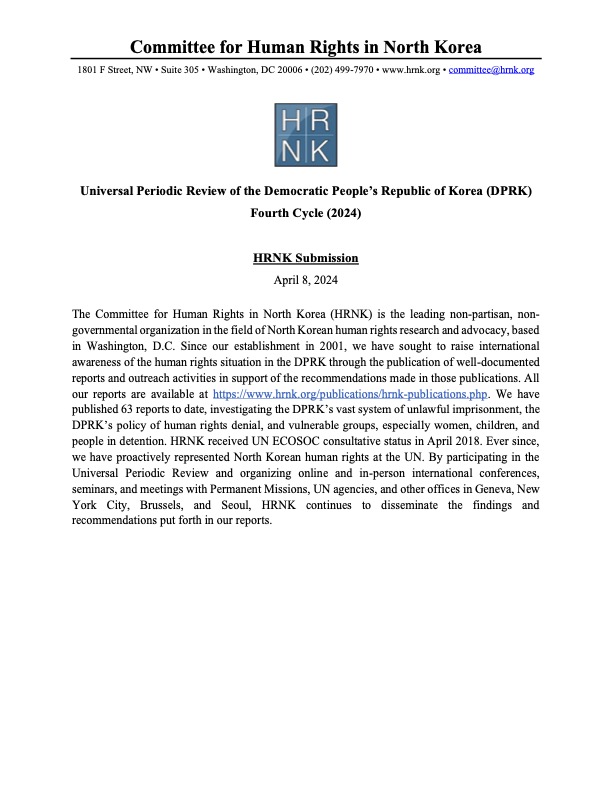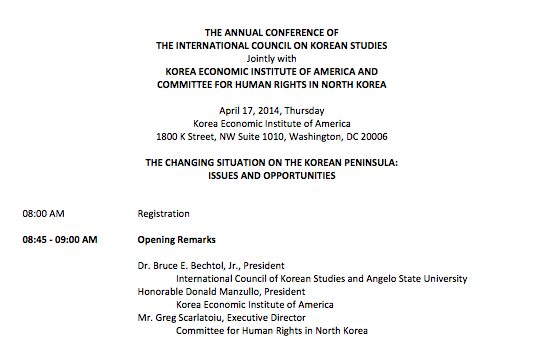
April 17, 2014
On April 17, 2014, from 8:45 am to 6:00 pm, HRNK, KEI, and the International Council on Korean Studies (ICKS) will co-host the 2014 Annual Conference of the International Council on Korean Studies. The human rights panel discussion, held from 9:00 to 11:45 am, will be moderated by Greg Scarlatoiu, HRNK executive director. The panelists will include: Roberta Cohen (HRNK co-chair and senior non-resident fellow, The Brookings Institution), who will address the forcible repatriation of North Korean refugees by China; Robert Collins (author of HRNK’s report “Songbun, North Korea’s Social Classification System”), who will address the human rights implications of the succession process in North Korea; and Bruce Bechtol (Angelo State University), who will address the impact of proliferation and illicit activities on the North Korean human rights situation. The discussants will be Amanda Mortwedt Oh (HRNK) and Soon Paik (U.S. Department of Labor and ICKS).
To register for this event, please click on this link.
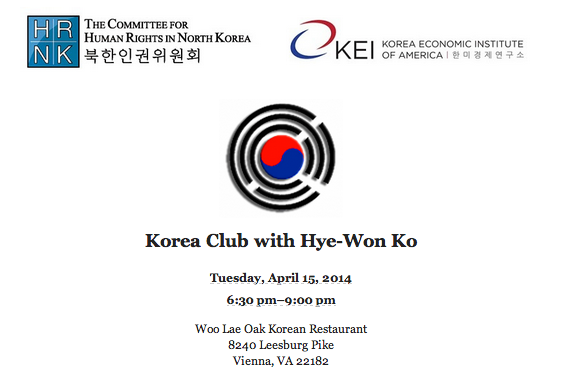
April 15, 2014
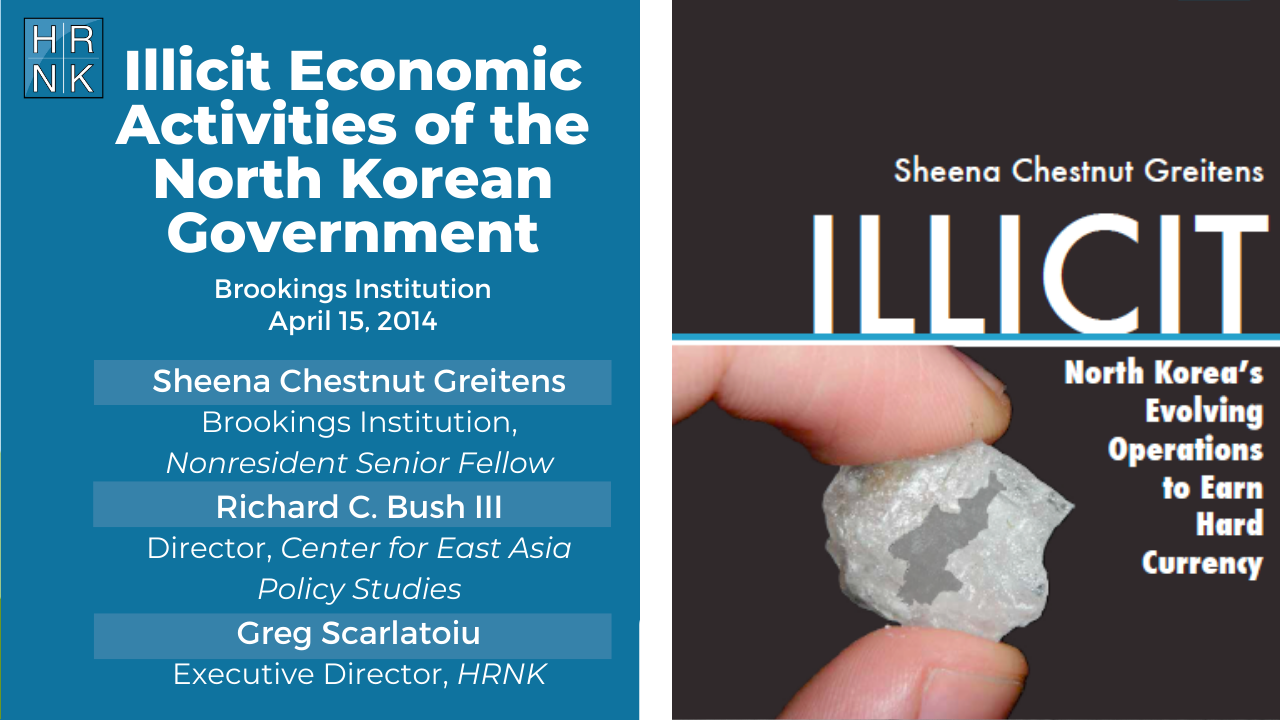
April 15, 2014
Excluded from most international economic activities by numerous sanctions and its own policies, the North Korean regime has enabled--and sometimes directly participated in–illicit economic activities to earn hard currency that it needs for regime survival. These activities include the production and distribution of narcotics and counterfeit currency, the smuggling of a range of illicit goods, and other unconventional revenue-generating activities. Such operations have been critical in preserving the North Korean regime.
On April 15, the Center for East Asia Policy Studies at Brookings will host the release of a report from the Committee for Human Rights in North Korea (HRNK), entitled "Illicit: North Korea's Evolving Operations to Earn Hard Currency." The report, authored by Brookings Nonresident Senior Fellow Sheena Chestnut Greitens, analyzes the history and current status of North Korea's foreign currency earning operations, focusing on illicit activities. It discusses how these activities have changed in recent years and the implications for U.S. and international policies toward North Korea. Nicholas Eberstadt of the American Enterprise Institute and Marcus Noland of the Peterson Institute for International Economics, both HRNK board members, will comment on the presentation.
After the panel, the speakers will take audience questions.
Please click on this link to RSVP.
.png)
April 14, 2014
In March 2013, the 47 member states of the United Nations Human Rights Council unanimously adopted a resolution to establish a commission of inquiry on human rights in North Korea. With a mandate to investigate “the systematic, widespread and grave violations of human rights” in North Korea, the commission conducted public hearings and private interviews, and collected information from U.N. member states and entities. The commission submitted its report to the U.N. Human Rights Council in March 2014, finding that “in many instances, the violations found entailed crimes against humanity based on state policies."
On April 14, the Center for East Asia Policy Studies at Brookings and the Committee for Human Rights in North Korea (HRNK) will host an address by Michael Kirby, chair of the U.N. Commission of Inquiry on Human Rights in North Korea (COI), to present its findings and recommendations. Following the keynote address, Marcus Noland of the Peterson Institute for International Economics and an HRNK board member, will comment on the COI report and discuss policy implications for the United Nations and its member states, and possible impact on North Korea and its people.
After the panel, the speakers will take audience questions.
To register for this event, please click on this link.
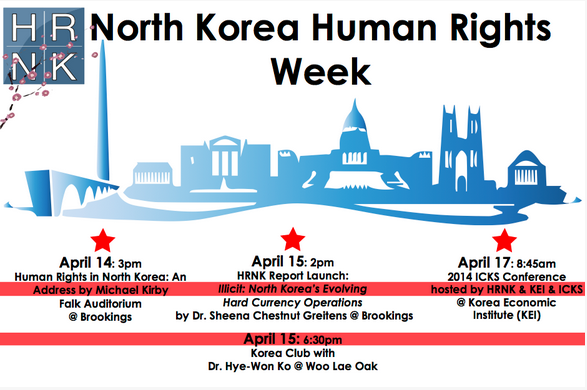
April 14, 2014
Please click on this link to view the itinerary and to RSVP.

March 24, 2014
Please click on this link to view the program.
To view the event, please click the following links:
Part 1
Part 2
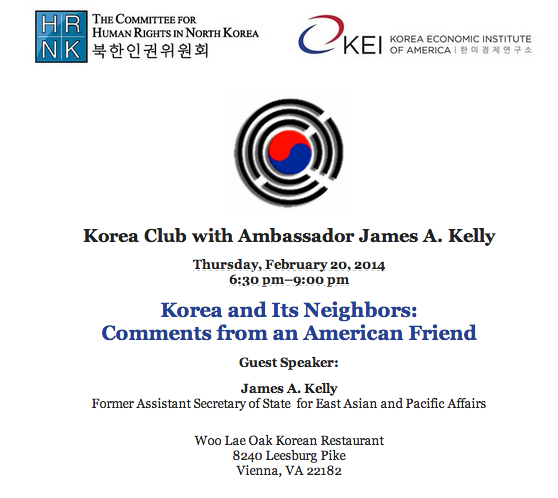
February 20, 2014
![]()
November 14, 2013
The tenuously but long divided Korean peninsula poses a problem of huge proportions for the people of North and South Korea.
But the ramifications of what will happen if the North Korean government falls, or if civil war erupts between the North and South affect much of the world, particularly the United States.
Thursday, Angelo State University’s Center for Security Studies hosted a lecture series, featuring three of the nation’s leading scholars on North Korea.
Titled “Preparing for Collapse in North Korea: Challenges and Issues,” the expert panel “explored the varied issues the world will have to face with a collapsing North Korea,” said Bruce Bechtol, a political scientist and Korean Peninsula expert on ASU’s security studies faculty.
In introducing the panel, Bechtol said: “We should all care about this because the North Koreans proliferate weapons of mass destruction to rogue states like Syria.
“They threaten U.S. forces in Asia with missiles and nuclear weapons, and yet the government is so unstable that it could collapse at any time. Because of this, we may see in the near future more U.S. troops deploying to the Korean Peninsula to conduct stabilization operations.”
Seated on the panel were David S. Maxwell, Greg Scarlatoiu and Richard C. Bush III.
Maxwell, associate director of the Center for Security Studies and the Security Studies Program at Georgetown University, who as a retiring Special Forces colonel in 1999 authored the first contingency plan for the fall of North Korea’s government, spoke on the fragile situation of the “unnaturally divided Korean peninsula.”
“The war between North and South Korea has not officially ended,” Maxwell reminded the audience filling one of the largest classrooms in the Rassman building. The armistice signed at the end of the Korean conflict, or “forgotten war,” set the goal or reuniting the no
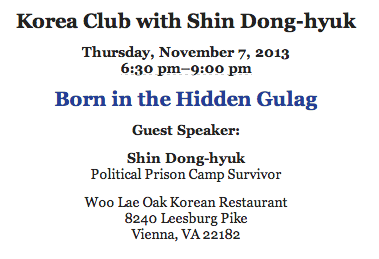
November 07, 2013
The Korea Club meton Thursday, November 7, 2013 and featured
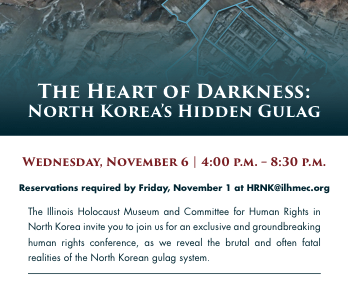
November 06, 2013
The Illinois Holocaust Museum and Committee for Human Rights in North Korea invite you to join us for an exclusive and groundbreaking human rights conference, as we reveal the brutal and often fatal realities of the North Korean gulag system. Please click on the link here to view the agenda.
Reservations required by Friday, November 1 at
[email protected]
Please view the conference video here.

October 30, 2013
My remarks will concentrate on the most vulnerable women in North Korean society, those imprisoned in political penal labor camps (kwan-li-so), long term prison labor facilities (kyo-hwa-so), and in police interrogation and detention centers on the China-North Korea border.
The Commission of Inquiry will have to consider whether these women have been subject to widespread practices that punish, degrade, violate, intimidate and humiliate them while in custody. It must also consider whether the forced abortions carried out against pregnant women forcibly returned to North Korea from China and held in detention facilities constitute state sponsored sexual violence and whether the reported killings of their babies constitute state sponsored infanticide and racially motivated murder.
Please view the full transcript here.
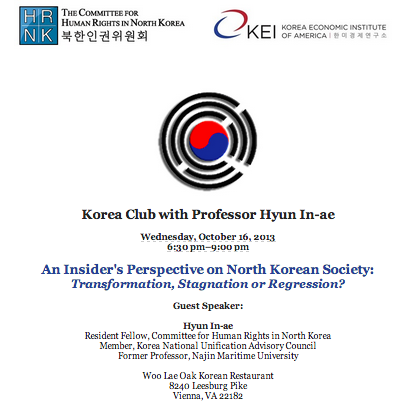
October 16, 2013
Korea Club with Professor Hyun In-ae
Wednesday, October 16, 2013
6:30 pm–9:00 pm
An Insider's Perspective on North Korean Society:
Transformation, Stagnation or Regression?
Guest Speaker:
Hyun In-ae
Resident Fellow, Committee for Human Rights in North Korea
Member, Korea National Unification Advisory Council
Former Professor, Najin Maritime University
Woo Lae Oak Korean Restaurant
8240 Leesburg Pike
Vienna, VA 22182
Dear Colleagues and Friends:
You are invited to attend a meeting of the Korea Club on Wednesday, October 16, 2013. The event will feature Professor Hyun In-ae who will give a presentation entitled "An Insider's Perspective on North Korean Society: Transformation, Stagnation or Regression?"
Professor Hyun In-ae studied philosophy at Kim Il Sung University in the 1970s, and taught Juche philosophy at Najin Maritime University in North Hamgyong Province from 1979 to 1988 and at Chongjin Medical College from 1988 to 2001. She left North Korea and arrived in South Korea in 2004. A founding member of North Korean Intellectuals Solidarity (NKIS), she served as the organization's deputy representative. She has written numerous articles and given lectures at a variety of institutions in South Korea. She is a member of the Republic of Korea National Unification Advisory Council (NUAC). She has completed a master's degree at Ehwa Women's University in South Korea and is in the process of completing a doctoral degree at the same university. Since January 2013, she has been a resident fellow at the Committee for Human Rights in North Korea (HRNK) in Washington, D.C.
PROGRAM DETAILS
Reception will begin at 6:30pm, followed by a buffet dinner at 7:00 pm, and the speaker’s presentation and Q & A session. The
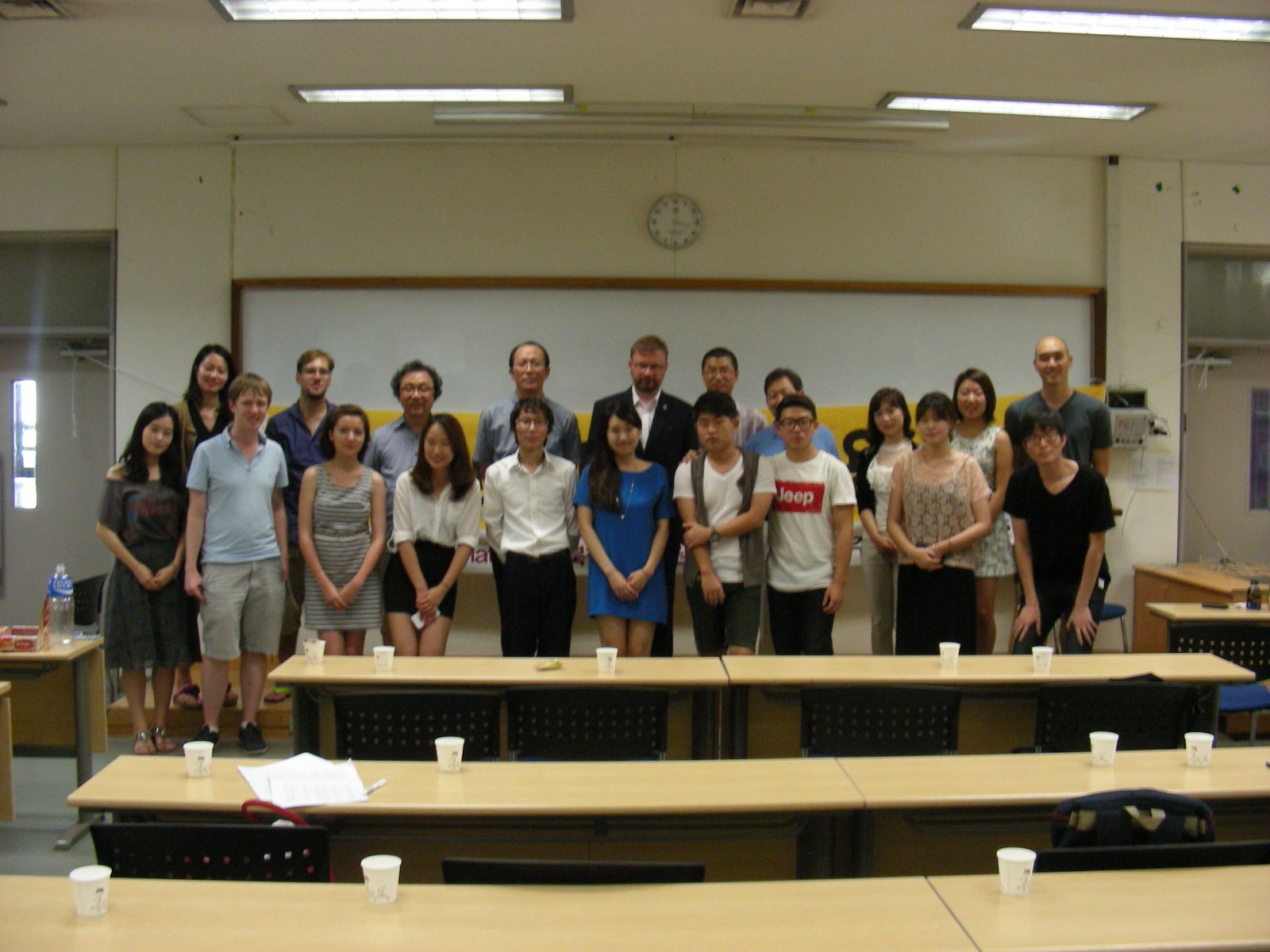
August 16, 2013
Please click on this link to view the photographs taken at this lecture.
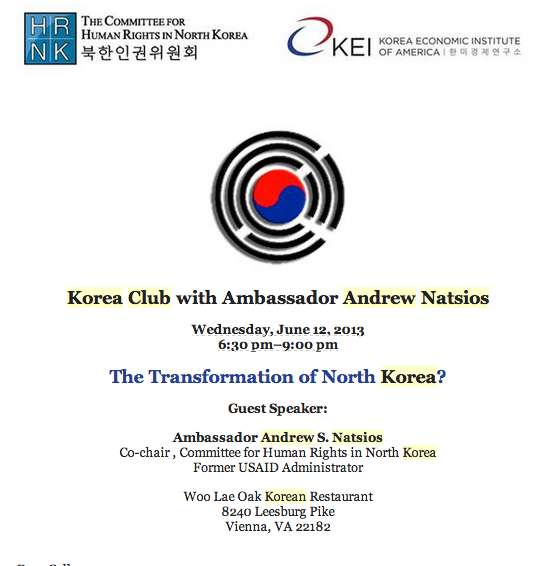
June 12, 2013
The Korea Club met on Wednesday, June 12, 2013 and featured Ambassador Andrew Natsios, who gave a presentation entitled “The Transformation of North Korea?”
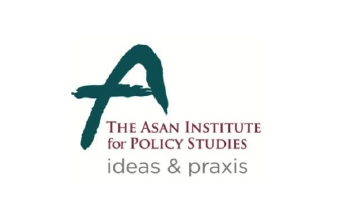
May 23, 2013
If and when Korean unification takes place, undertaking a fair and transparent process of transitional justice will be one of the key elements for peace-building and reconciliation in a reunified Korea. This conference will bring together renowned experts on North Korea, human rights, and transitional justice to examine the issue of transitional justice in a post-reunified Korea.
Please click on this link to view the conference agenda.
Please RSVP to Ms. Collins at
[email protected] by Thursday, May 16, 2013.
.png)
April 02, 2013
Please click on the link for the conference agenda.
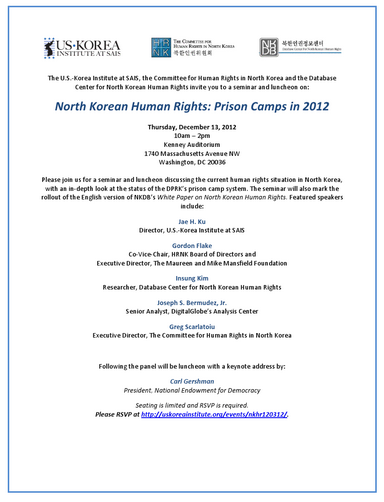
December 13, 2012
Jae Ku, director of the U.S.-Korea Institute at SAIS; Gordon Flake, co-vice chair of the board of directors at Human Rights North Korea and executive director of the Maureen and Mike Mansfield Foundation; Insung Kim, researcher at the Database Center for North Korean Human Rights; Joseph Bermudez Jr., senior analyst at DigitalGlobe’s Analysis Center; and Greg Scarlatoiu, executive director of the Committee for Human Rights in North Korea, discussed this topic. Keynote remarks were delivered by Carl Gershman, president of National Endowment for Democracy, during lunch following the panel discussion.

November 28, 2012
STATEMENT BY ROBERTA COHEN AT THE INTERNATIONAL FORUM ON NORTH KOREA, SPONSORED BY THE NATIONAL ENDOWMENT FOR DEMOCRACY, THE KOREA INSTITUTE FOR NATIONAL UNIFICATION AND THE HENRY JACKSON SOCIETY, LONDON, NOVEMBER 28, 2012
In my remarks today as a discussant, I’m going to focus on the challenges to information gathering in the case of North Korea. But first let me begin by emphasizing the importance of unearthing information about the extent of human rights violations in the country. The organizations on this panel have helped bring to light extensive information about human rights in North Korea. As a result of their meticulous work, governments and the United Nations have been able to rely on this information for their own reports and policy positions on North Korea.
We have heard from our panelists today that public executions may be on the decline in North Korea, in part because of international criticism. We have also heard that North Korea's participation in the Paralympic games may signal a change in policy toward the disabled. And we have heard that fewer people are dying from starvation because they have learned to survive by growing their own food which the government is increasingly permitting. All these areas are being researched as are the prison camps, where particular efforts are being made to ascertain whether one camp has been closed down and another relocated and the significance of such information.
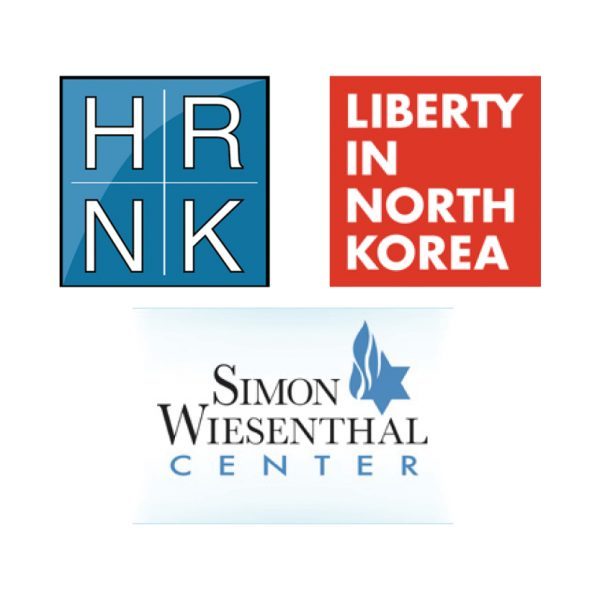
October 12, 2012
.jpeg)
September 11, 2012
The Story of Oh Kil-nam and His Family
Source: Chosunilbo
Dr. Oh Kil-nam was once a South Korean elite strongly opposed to the Yusin Constitution system, who left South Korea to study in Germany.
After the No. 3 Office of the Central Committee of the Workers Party noticed Dr. Oh in Germany, North Korean agents approached him and lured him to North Korea with promises of a position
in which he could study economics as much as he pleased. The North Korean agents also promised medical treatment for Dr. Oh’s wife, who was suffering from hepatitis. Because of these promises, Dr. Oh decided to enter North Korea in 1985, bringing his wife and two young daughters, Hye-won and Gyu-won, with him.
“It was a real donkey act!” Dr. Oh said of his decision. Upon arriving at the airport in Pyongyang, he had already realized his mistake. His family was sent to a military camp in the mountains, and they were forced to repeatedly and solely study the sayings of Kim Il-sung. After that he was posted to a position at the “Voice of National Salvation,” a North Korean radio propaganda broadcaster targeting South Korean people.
The following year, Dr. Oh was instructed to go to Germany to win over South Korean students studying there for the North Korean government. He was not allowed to bring his family with him to Germany, and they were forced to stay in North Korea. His wife, Shin Suk-ja, pushed him to take the opportunity to defect back to South Korea. Dr. Oh eventually asked for asylum in Copenhagen, Denmark in 1


.png)









.png)


.jpeg)







